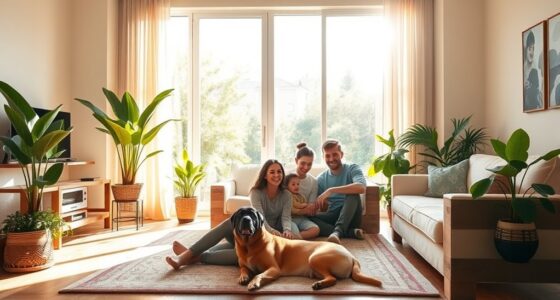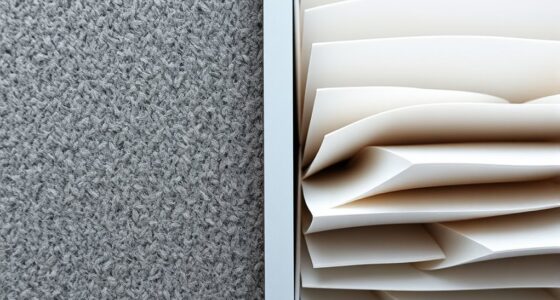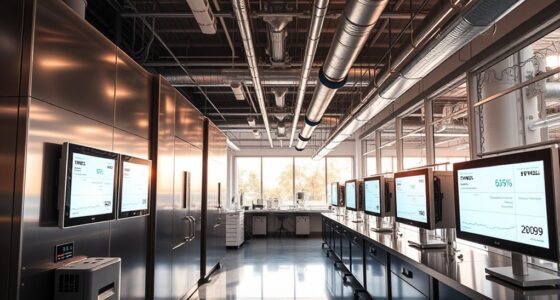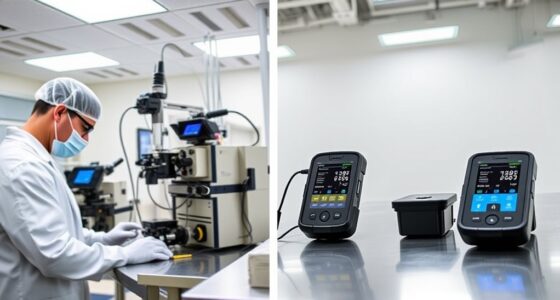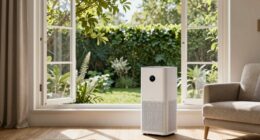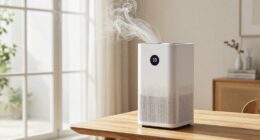AirRated Certification is your global benchmark for indoor air quality, ensuring building materials and products meet strict emission standards. It verifies that items don’t release harmful pollutants like VOCs or formaldehyde, helping create healthier indoor spaces. This certification involves rigorous testing and ongoing checks to maintain high standards. By choosing AirRated certified products, you’re supporting healthier environments and industry-wide improvements. To find out how this certification can benefit you, keep exploring the details below.
Key Takeaways
- AirRated certification sets a global standard for verifying indoor air quality of building materials.
- It involves rigorous testing for emissions of VOCs, formaldehyde, and other pollutants under real-world conditions.
- Certification is based on compliance with international benchmarks, ensuring product safety and healthfulness.
- Ongoing re-evaluation maintains certification integrity, promoting consistent indoor air quality over time.
- It provides stakeholders confidence in product quality, supporting healthier indoor environments worldwide.

Have you ever wondered how building materials are tested to guarantee they can withstand specific airflow conditions? When it comes to indoor air quality, ensuring materials meet strict standards is essential. That’s where the AirRated certification comes into play, serving as a global benchmark for indoor air quality. This certification isn’t granted lightly; it involves a rigorous process designed to verify that building materials and products meet high air quality standards. If you’re involved in designing, constructing, or specifying building components, understanding this process can help you make informed decisions that promote healthier indoor environments.
The certification process for AirRated begins with detailed testing that simulates real-world airflow conditions within buildings. Manufacturers submit samples of their products for evaluation, which then undergo a series of standardized tests. These tests measure emissions of volatile organic compounds (VOCs), formaldehyde, and other potentially harmful substances. The goal is to ensure that products do not release pollutants that could compromise indoor air quality. The testing environment is carefully controlled to mimic typical indoor settings, ensuring the results are relevant and reliable.
Once testing is complete, the results are reviewed against strict air quality standards set by industry authorities and international organizations. These standards serve as a benchmark to determine whether a product can be safely used in indoor environments without negatively impacting air quality. If a product passes, it earns the AirRated certification, signaling to builders, architects, and consumers that it has been independently verified to meet top air quality requirements. This certification provides confidence that the materials used won’t contribute to indoor pollution, which is vital for creating healthier living and working spaces.
AirRated certification confirms products meet strict indoor air quality standards for healthier spaces.
The certification process doesn’t end with initial testing. It also involves ongoing compliance checks and periodic re-evaluation to ensure products continue to meet the standards over time. Manufacturers often need to provide documentation and undergo audits to maintain their certified status. For you, as a stakeholder in building projects, this ongoing assurance means you’re choosing products that adhere to the highest air quality benchmarks, reducing potential health risks associated with poor indoor air. Additionally, understanding the testing standards involved helps ensure that the products you specify are genuinely compliant and reliable.
In essence, the AirRated certification simplifies the complex process of verifying indoor air quality compliance. By adhering to established air quality standards and undergoing a thorough certification process, manufacturers demonstrate their commitment to healthier indoor environments. As a result, you can trust that certified products will contribute positively to the air you breathe indoors. This certification not only elevates product credibility but also helps promote industry-wide improvements in indoor air quality, making healthier spaces more attainable for everyone.
Frequently Asked Questions
How Does Airrated Certification Impact Product Pricing?
AirRated certification can increase your product cost because achieving this standard involves higher-quality materials and rigorous testing. However, it also boosts your market value by demonstrating superior indoor air quality, which attracts more customers. This certification helps differentiate your products, justifying premium pricing. While initial expenses are higher, the certification ultimately enhances your product’s reputation and profitability, making it a worthwhile investment for long-term success.
What Industries Benefit Most From Airrated Certification?
Think of industries like hospitals, offices, and schools as guardians protecting their inhabitants from indoor pollution. They benefit most from AirRated certification because it guarantees compliance with ventilation standards, improving air quality and occupant health. By earning this certification, you set a higher standard, attracting trust and reducing health risks. It’s a powerful tool to showcase your commitment to safety, making your environment safer and more appealing for everyone inside.
Can Existing Buildings Get Retrofitted for Airrated Compliance?
Yes, you can retrofit existing buildings for AirRated compliance. You’ll need to upgrade ventilation systems to meet new standards, which can be challenging due to space constraints or outdated infrastructure. It’s essential to assess current ventilation standards, identify gaps, and work with professionals to implement effective solutions. While retrofit challenges exist, prioritizing indoor air quality improvements benefits occupant health and helps your building achieve AirRated certification.
How Often Is Airrated Certification Renewal Required?
You need to renew your AirRated Certification annually to guarantee ongoing compliance. The renewal process involves re-evaluating indoor air quality standards and submitting updated documentation. Certification validity typically lasts for one year, after which you must complete the renewal process to maintain your status. Staying proactive with these renewals guarantees your building continues to meet the global benchmark for indoor air quality, ensuring a healthy environment for occupants.
Are There Regional Variations in Airrated Standards?
You might think regional standards vary considerably, but AirRated certification guarantees consistency worldwide. While some regions may have specific requirements, the certification process aims to create a unified benchmark for indoor air quality. This means your space can meet consistent quality standards no matter where you are, simplifying compliance and ensuring safety. So, regional differences exist, but the certification’s goal is to maintain uniform standards for global certification consistency.
Conclusion
With AirRated Certification, you’re opening the door to a world where clean indoor air becomes your sanctuary. Think of it as a guiding star, leading you through a cloudy sky of pollutants to clarity and purity. When you choose certified spaces, you’re not just breathing easier — you’re embracing a healthier future. Let AirRated be your compass, transforming your environment into a gust of fresh air where wellness truly thrives.


